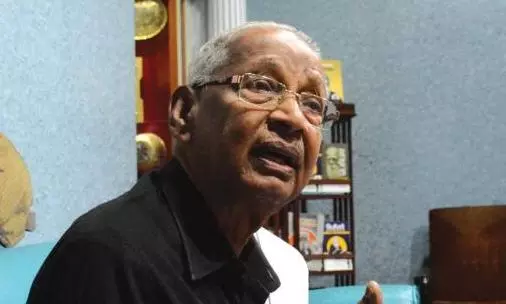Nothing Like Personal Touch, Says Oldest Campaigner

Chennai: Digital propaganda for elections was no match to the traditional campaign carried out through public meetings and door-to-day visits with the essential human touch that too at a time when the credibility of social media had come under a cloud, says K Veeramani, the president of Dravidar Kazhagam, who has unfailingly hit the campaign trail for every polls in the last 72 years since the first elections were held in independent India in 1952.
Though the Dravidar Kazhagam (DK), founded by Periyar E V Ramasamy, never contests elections, it invariably takes a political stand and campaigns for the party that upheld its ideologies and Veeramani, who was associated with the party since 1943 when he first delivered a speech as a 10-year-old boy standing on a table in a meeting, has been an evergreen campaigner.
Veeramani, who was not eligible to vote when he embarked on his maiden campaign as 21 years was the qualifying age then, continues his election propaganda even now at the age of 91 by going on a whirlwind tour as a star campaigner of the DMK-led alliance in the State, canvassing against the BJP and its allies.
Way back in 1999 when the DMK was aligned with the BJP, Veeramani campaigned for the rival AIADMK led by J Jayalalithaa, though the DK was supporting the DMK even after M G Ramachandran broke away from it to form the AIADMK in 1972. Earlier, the DK had opposed the DMK in the initial years of its formation till it formed a government 1967 and then arrived at a rapprochement with Periyar.
Recalling his experiences, as perhaps the oldest election campaigner in the country, he said that in 1971, many DMK leaders were skeptical of the DK’s support and campaign in favour of their party because an incident that happened at Salem was blown out of proportion by those opposed to the DMK. Since the DK was holding a conference to eradicate superstition ahead of the election, a rally was taken out through the streets with Periyar leading the procession in a vehicle followed by marchers and tableaux.
One of the volunteers of the Jan Sangh, who were organizing a black flag demonstration on the side of the road, hurled a footwear at Periyar that missed him but landed on another DK worker who was marching behind him. He picked up the footwear and started beating an image of Lord Ram that was in a tableau that was part of the procession. Though no newspaper reported the incident the next day, some leaders blew it up subsequently, putting the fear of loss among some DMK leaders.
But the DK continued with its campaign as DMK leader M Karunanidhi wanted it to go on and finally the DMK emerged victorious bagging 184 of the total 234 seats in the Assembly. In that election, the late K Kamaraj, who was earlier backed by Periyar when he became the Chief Minister first, and C Rajagopalachari (Rajaji), who had supported the DMK in 1967, had joined hands to defeat the DMK, Veeramani recalled.
The rival Congress was so confident of winning the polls that the leaders even met at Rajaji’s house and finalized a Cabinet with R Venkatraman as Chief Minister. When the DMK finally won and organized its swearing in a hurry with Periyar attending it, Veeramani said.
Another anecdote he recounted related to the 1952 election in which ballot boxes with party symbols on them were used before the introduction of the ballot paper. In that era, the ballot boxes initially were of different colours indicating different parties and campaigners will say cast your vote in the ‘yellow box’ or ‘green box’ or whatever. Then after the symbols came in, they would refer to the boxes as ‘Maattu peti’ (cow box – for the party with the cow as election symbol) and so on.
It was at that time Periyar and his acolytes, including Veeramani, told voters ‘Maatu petiiyil mana alli podu,’ which is a slang to mean ‘finish off the party’ (the Congress) but literally meant throw sand into the box. When the ballot boxes were opened during counting and emptied on the table, piles of sand spilled out, along with the ballots, from the box with the cow symbol, indicating people having actually thrown sand into the box during polling.
So, from the era of ballot boxes to the age of electronic voting machines through the phase of ballot papers, Veermani had seen all kinds of voting but what differences did he see in the campaigns? He says that of late, he witnessed more women political supporters attending campaign meetings and sitting through the speeches, indicating political loyalty. The crowds that were paid for would vanish after some time but now that women were attending the meetings on their own was an indication of growing political awareness, he said.
He also had a word of praise for the Supreme Court as had played the role of the guardian of the Constitution and protector of democracy through its verdicts on some cases. Another observation of his is that the wave of support for Narendra Modi that was palpable in 2014 is missing now.

